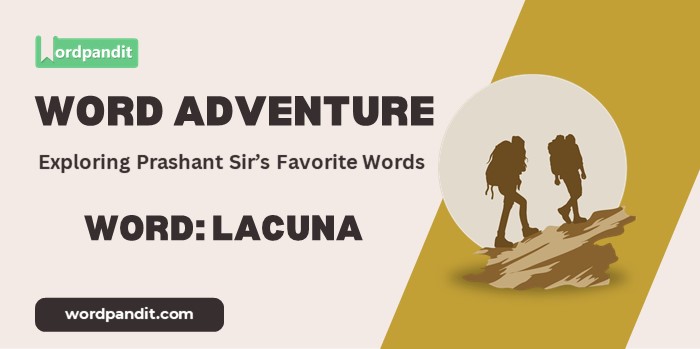Word Adventure: Lacuna
The Headline
"Lacuna: The Eloquent Silence in Language and Life"
The Scoop
In the intricate tapestry of language, sometimes it's not just the threads that matter, but the spaces between them. 'Lacuna' is one such word that draws our attention to these gaps, these missing pieces that often speak volumes in their silence. Let's embark on a journey to explore this intriguing concept that finds relevance in literature, science, and everyday life.
Let's Break It Down
The Plot Thickens
'Lacuna' comes to us from Latin, where it originally referred to a pit or pool. Over time, its meaning evolved to encompass any kind of gap or missing part, especially in written works. This semantic journey reflects how language itself can have lacunae – gaps in meaning that evolve over time.
In literature, lacunae can be powerful tools. A deliberate omission can create suspense, invite reader interpretation, or highlight the limitations of a narrator's knowledge. Think of the famous "lost time" in Marcel Proust's "In Search of Lost Time" – a lacuna that becomes central to the narrative.
Beyond literature, the concept of lacuna finds applications in various fields. In biology, it refers to small cavities in bone or cartilage. In music, it can denote a missing part in a score. This versatility underscores how the idea of 'meaningful gaps' resonates across different domains of human knowledge and creativity.
Word in the Wild
The Twist
Here's an intriguing aspect of lacunae: while we often think of gaps as deficiencies, they can actually be sources of creativity and discovery. In archaeology, lacunae in artifacts challenge experts to reconstruct the past. In communication, what's left unsaid often carries significant meaning. This perspective invites us to see lacunae not just as absences, but as spaces of possibility – in our understanding, our creativity, and our interactions with others.
Make It Stick
Lacuna: Where silence speaks volumes and absence makes the mind grow fonder!
Your Turn
Think about a time when you encountered a significant lacuna – maybe a gap in a story that left you wondering, or a missing piece of information that changed your understanding of a situation. How did you respond to this absence? Share your lacuna experiences in the comments below. Let's explore how these gaps shape our perceptions and spark our imaginations!
Down the Rabbit Hole
- Curious about how lacunae are used in literature? Explore the works of modernist authors like Virginia Woolf or James Joyce.
- Interested in the role of lacunae in historical research? Look into the challenges of working with fragmentary ancient texts or incomplete archaeological finds.
- Want to explore the psychological aspects of gaps in information? Dive into studies on the 'fill-in' effect or the role of ambiguity in art appreciation.
The Last Word
As we conclude our exploration of 'lacuna', I hope you've gained a new appreciation for the power of gaps and absences in language and life. It reminds us that sometimes, what's not there can be just as meaningful as what is. The next time you encounter a puzzling omission or a pregnant pause, remember – you're not just facing a blank, you're experiencing a lacuna! Until our next word adventure, this is Prashant from Wordpandit, encouraging you to mind the gaps and find meaning in the spaces between!












